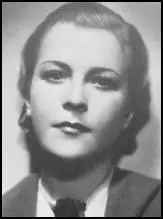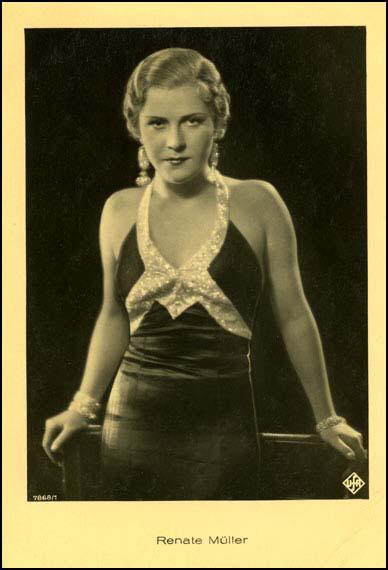Renate Müller

Renate Müller was born in Munich, Germany, on 26th April 1906. She became an actress and made several films including Love in the Ring (1930), The Son of the White Mountain (1930), Darling of the Gods (1930), Flute Concert of Sans-Souci (1931), The Office Girl (1931), The Little Escapade (1931), When Love Sets the Fashion (1932) and Cairo Season (1932).
Müller meet Adolf Hitler while making a film on location near the Danish coast in the autumn of 1932. He watched the shooting all day and in the evening visited the house where she was staying. She later told the film director, Adolf Zeissler: "He sat there, not moving at all, looking at me all the time, and then he'd take my hand in his and look some more. He talked all the time - just nonsense."
Ronald Hayman, the author of Hitler and Geli (1998): "After this he arranged frequent meetings with her, and the jewellery he gave her included a diamond bracelet more valuable than any of his presents to Geli and Eva Braun. But the demands he made were as unpalatable to her as to Geli. One night, for instance, at the Chancellery, he began by going into detail about Gestapo methods of torture, comparing them with medieval techniques. After they had both taken their clothes off he lay on the floor, begging her to hit him and kick him. She refused, but he went on heaping accusations on his own head, saying he was her slave, unworthy to be in the same room. Eventually giving in, she started to kick him, abuse him with obscene words and hit him with his whip. Becoming increasingly excited, Hitler started to masturbate. After his orgasm, he suggested quietly that they should both put their clothes on. They drank a glass of wine together and chatted about trivialities. Finally he stood up, kissed her hand, thanked her for a pleasant evening and rang for a servant to show her out."

Renate Müller gained permission from Adolf Hitler to visit London. It has been claimed that the Gestapo "kept her under surveillance while she was there, and after spending a lot of time with a former lover, Frank Deutsch, who was Jewish, she found, on returning to Germany, that she had been blacklisted". She also heard rumours that suggested she was going to be put on trial for "race defamation". Her friends claim that under this pressure she became addicted to morphine.
According to Cate Haste, the author of Nazi Women (2001): "With her career in ruins, she became addicted to morphine and was sent to a sanatorium. Having asked for, and been refused, permission to see Hitler in 1936, she returned to the sanatorium."
On 1st October 1937 Renate Müller was looking out of a window when a car pulled up outside the sanatorium and four SS officers got out. In a state of panic she jumped out of the window and was killed.
Primary Sources
(1) Ronald Hayman, Hitler and Geli (1998)
Renate Miiller... met Hitler in the autumn of 1932 when she was filming on location near the Danish coast. He watched the shooting all day, and, in the evening, visited the house where she was staying, but his behaviour, when they were together, was distinctly odd. At forty-three, he still seemed ill at ease when alone with a glamorous woman. "He sat there, not moving at all, looking at me all the time, and then he'd take my hand in his and look some more. He talked all the time - just nonsense." Later, when she was invited to a party at the Chancellery, he ignored her until everyone was leaving but then took her arm, offering to show her round the building. He pointed out the changes he had made and took her to his wardrobe, where he brought out his tail-coated dinner shirt, saying he had never worn evening dress till he came to power.
After this he arranged frequent meetings with her, and the jewellery he gave her included a diamond bracelet more valuable than any of his presents to Geli and Eva Braun. But the demands he made were as unpalatable to her as to Geli. One night, for instance, at the Chancellery, he began by going into detail about Gestapo methods of torture, comparing them with medieval techniques. After they had both taken their clothes off he lay on the floor, begging her to hit him and kick him. She refused, but he went on heaping accusations on his own head, saying he was her slave, unworthy to be in the same room.
Eventually giving in, she started to kick him, abuse him with obscene words and hit him with his whip. Becoming increasingly excited, Hitler started to masturbate. After his orgasm, he suggested quietly that they should both put their clothes on. They drank a glass of wine together and chatted about trivialities. Finally he stood up, kissed her hand, thanked her for a pleasant evening and rang for a servant to show her out.
When she wanted to take a holiday in London, she asked his permission, which was granted, but the Gestapo kept her under surveillance while she was there, and after spending a lot of time with a former lover, Frank Deutsch, who was Jewish, she found, on returning to Germany, that she had been blacklisted, and it was rumoured that she was to be put on trial for "race defamation". While under this pressure, she became addicted to morphine. Eventually she went into a sanatorium and, after being discharged, asked for an interview with Hitler, who refused to see her. Back in the sanatorium, she was looking out of the window one day when a car pulled up in the street below, and four SS officers got out. She killed herself by jumping out of the window. She was thirty.
Had she survived, she could possibly have been dangerous to Hitler in the same way as Geli could: either of them could have damaged him by revealing the truth about his sexual habits. In 1937, when her death was reported in the German papers, they revealed neither that Hitler had known her nor that she had killed herself. According to the Volkischer Beobachter, it had been known for some time that she was "no longer in the best of health". Hitler did not attend the cremation, but Goebbels sent a wreath.
(2) Cate Haste, Nazi Women (2001)
For some women, it ended in disaster. The glamorous actress Renate Muller met him in 1932, when he spent a day watching the shooting of her latest film. When he visited her in the evening, she found his behaviour distinctly odd, according to the account she later gave to director Adolf Zeissler, which he published in a magazine, and was later used as a source in the American OSS report about Hitler's sexual perversions. "He sat there, not moving at all, looking at me all the time, and then he'd take my hand in his and look some more. He talked all the time - just nonsense.'' She was invited to a party at the Chancellery, at the end of which Hitler offered to show her round the building, including his wardrobe of clothes. He arranged frequent meetings and sent her expensive jewels, until one night he took her to his rooms, where, allegedly after a discussion about methods of torture, she claimed she was required to kick and beat him, while he declared himself her slave. After he had excited himself to orgasm, he suggested that they put their clothes on, and they drank a glass of wine and chatted, until he stood up, kissed her hand, and thanked her for a pleasant evening. The reliability of the source, as with the whole OSS report, is however open to question.
Muller's subsequent history was tragic. Allegedly with Hitler's permission, she took a holiday in London, where she spent some time with a former lover who was Jewish, despite being trailed, she believed, by the Gestapo. On her return, she was blacklisted, and rumours circulated that she was to be put on trial for "race defamation" having a relationship with a Jew. With her career in ruins, she became addicted to morphine and was sent to a sanatorium. Having asked for, and been refused, permission to see Hitler in 1936, she returned to the sanatorium, but when she saw a car pull up outside, and four SS men get out, she killed herself by throwing herself out of a window. Goebbels sent a wreath to her funeral. Renate Muller was another addition to the tally of women around Hitler who committed suicide.
